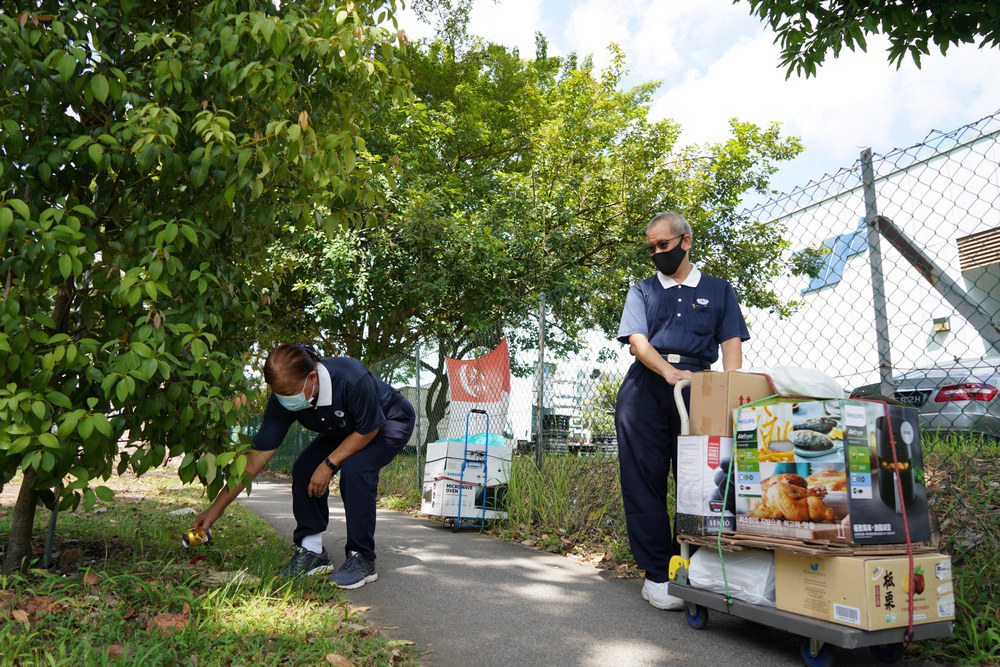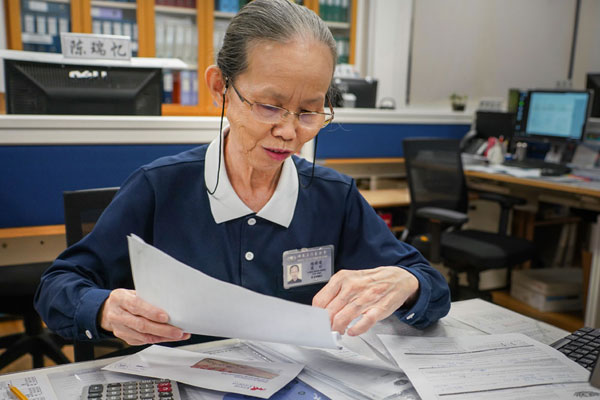
Though Wang (left) is not highly educated, he has benefitted greatly from the “Dharma as Water” study sessions and has never missed a single class. (Photo by Lee Kwong Seng)
After his grandmother passed away, Wang Yong Zheng, who had always been vexed by his mother’s actions, would repeatedly ask his elders if she was truly his biological mother. Yet, this question is no longer important to Wang today. If his mother were still alive, his only wish is to call out to her with one word : “Mother!”
Cold Desertion Fans the Flames of Resentment
Born in Kelantan, Malaysia, Wang was raised by his grandmother since he was a child. His grandmother did not have any biological children of her own, and Wang’s mother was her only adopted child. As the only grandson in a wealthy family, Wang was the apple of his grandmother’s eye. Whatever Wang desired, his grandmother would oblige, and their relationship was especially close. Yet, the same could not be said for all of his other family members; in particular, Wang harboured a strong resentment against his mother.
When Wang was a young child, his mother would whip him even as she fed him his food. On the other hand, she loved his sisters dearly, often talking and laughing with them. At the age of seventeen, when Wang decided to leave for Singapore to strike out on his own, his mother offered him neither a word of blessing nor concern. She never once visited him, nor did she even call to find out how he was. In the face of such blatant indifference, Wang felt that he was merely a stranger in his mother’s eyes, and day by day, the knot in his heart tightened a little more.
Subsequently, Wang’s grandmother fell ill and his mother began to refer to her derogatively as the “old crone.” Every time Wang returned to his hometown for a visit, he would hear his mother cursing and scolding. Confined to her bed by illness for years, his grandmother’s body began to fester with sores. She was wracked by pain, yet Wang’s mother never once sought medical attention for her.
The day his grandmother died, Wang’s mother shed no tears; she laughed instead, and would not allow Wang to cry. Wang took it all in, etching the sorry scenes deeply in his heart.
Later, as Wang prepared to leave for Singapore, his mother told him coldly, “In future, you no longer need to step foot into this house, because you visit only on account of your grandmother’s inheritance.” With her cruel statement, the last vestiges of kinship between mother and son was completely severed.
Wang’s final retort to his mother rang with bitter defiance: “If you go before Father, on account of him, I will see to your funeral arrangements; if he goes first, you will not have a son to see you off on your last journey!”
As a devout Buddhist, a result of his grandmother’s influence, Wang often practiced giving to others. Yet he had never once given his own mother an allowance. Whenever he returned to his hometown to pay respects to his ancestors, he would take pains to avoid seeing his mother.
In 2005, Wang received a call from relatives informing him that his mother had passed away. He replied without a shred of emotion:“I will see to her final arrangements in the same manner that she saw to grandmother’s.”
Throughout, Wang did not shed a single tear and showed no trace of grief. His mother’s funeral arrangements were haphazardly done; he went through the motions perfunctorily, his heart as cold as stone.
Over the years, whenever his wife and children asked about his mother, Wang never had a good word to say. He could not find it in his heart to forgive her for the way she treated him.
Meeting One’s Master, Transforming the Future
Wang’s career progressed smoothly and he settled down permanently in Singapore. In 2012, he returned to his hometown to assist his father in drawing up a will. At the lawyer’s office, he happened to catch the programme, “Master Cheng Yen’s Daily Journals,” broadcasted by Da Ai TV. Moved by what he saw, Wang silently made a vow to himself –one day, he would seek refuge under Dharma Master Cheng Yen.
Two months later, Wang again returned to Malaysia. This time, the lawyer assisting in his father’s will, Liu Jing Hui, a Tzu Chi volunteer, gave him the address of the Tzu Chi Foundation in Singapore after seeing how much he had identified with Tzu Chi’s ideals. Wang quickly became a member and not only did he donate money to support the organisation’s charitable causes, he also started to actively participate in Tzu Chi’s activities.
Unexpectedly however, bad news hit Wang like a bolt from the blue after he went for a check up at the hospital three months later. The test results showed that he had third stage prostate cancer.
Tears ran down his face; a distraught Wang could not accept the fact. Initially rejecting all three proposals by the doctor that he undergo surgery, receive chemotherapy and take medications as he considered them a waste of money, Wang finally conceded to surgery after some persuasion by his children.
Post-surgery in April 2012, Wang made a vow in front of Buddha : if he was cured, he would be willing to give more of himself in helping others. After 12 days, Wang was no longer dependent on a urine bag and his road to recovery was faster than expected.
Returning to Tzu Chi, Wang began to volunteer actively again, never passing up a chance to be of service. With much culinary experience under his belt, he often volunteers in the kitchen, whipping up delicious vegetarian foods for volunteers at various large and small scale events.
◎ 行孝不能等 難舍終能舍
Filial Piety Cannot Wait
Wang is not highly educated and does not recognize many words that he comes across in the “Dharma as Water” sutra adaptation, what more of understanding the teachings behind them. With this in mind, he diligently attended the study sessions, and gradually began to understand what the “Five Poisons (greed, anger, ignorance, arrogance and doubt)” in Buddhism refer to. With the help of videos prepared by the class facilitator, Wang, who is neither computer nor internet savvy, is able to understand the teachings. He seldom misses a class and has benefitted greatly.
Having twice participated in presenting segments of the sutra adaptation, Wang practices the sign language and memorises the lyrics studiously. Like a stream of pure water, the teachings have entered his heart.
During the Ching Ming Festival in 2013, as he helped to clear the grave of his grandmother, Wang could not bear to see his aged father look so weak as he walked with obvious difficulty. Based in Singapore, Wang was also not in a position to help during the few occasions that his father was admitted to hospital for breathing difficulties.
Wang candidly admits that he was unable to put aside worldly concerns pertaining to his wealth and business. Even after his operation, he would turn up at his factory every day, ignoring pleas from his children to wind up the business and recuperate at home. However, seeing his father grow older day by day, the thought of fulfilling his filial duties arose in his mind. Torn between money and filial piety, Wang spent sleepless nights tossing and turning in bed.
Then, like an illuminating ray of light, the lyrics from the sutra adaptation came to his mind :“I repent flouting laws, being undisciplined and rebellious, I was unfilial to my parents and wanting in morals……”Repeating the words over and over again as he tried to memorise them, memories of his parents and past events played out again in his mind’s eye.
A penitent Wang regrets his actions. “No matter how my mother had treated me, it was already in the past; there was no need for me to cling on to old grievances. I didn’t even address her as “Mother”at her funeral.” In addition, Wang regrets that he had left his aged father to pass his days alone at home.
Heeding the words of the Master that good deeds and filial piety are acts that cannot be delayed, Wang made the decision to sell off the business and factory that he was his labour of love over more than 20 years. Retaining only two vegetarian food stalls, he decided to return to Malaysia, seizing the final chance to fulfil his duties as a son and care for his 82 year old father.
Back in his hometown, Wang sets aside at least one day a week to make the two-hour trip to the Tzu Chi office in Kelantan. There, he participates in sorting recyclables, prayer services and sharing sessions. At present, Wang shuttles between Singapore and Malaysia, attending “Dharma as Water” practice sessions in Singapore while taking care of his aged father in Malaysia. Thus engaged, his heart is both happy and willing.
In October, Wang was in Taiwan for the global entrepreneurs’ retreat. After the retreat, he stayed behind in Hualien to volunteer and finally realized his wish of seeking refuge under Master Cheng Yen. Amidst tears of joy, Wang vowed that he would pursue the Dharma in every lifetime, treading the path of a Tzu Chi volunteer. “The sutra adaptation is a gift to us from the Master. I hope that we can reach out to more people with this avenue of spreading the Dharma.”
In the past, Wang had never cooked a meal for his family members. Yet he now treasures the opportunity to prepare meals for his family, and cherishes the time he spends with his father. After every sutra recital session, Wang dedicates the merit to his late mother.
Fifteen years have gone by since the passing of his mother. If she were still alive, the word that Wang most wishes to say to her is simply“Mother!”Just like how a mist fades into nothing, all lingering doubts and grievances have been dispelled from Wang’s heart, leaving only the brightness and clarity that comes with the blessings of the Dharma.

“To prepare the snacks, I awoke at 2am this morning!”Wang Yong Zheng announced. During the 2013 charity bazaar o, Wang actively contributed his help, believing that it is a blessing to be able to be of service to others. (Photo by Chai Li Hong)

Wang feels that the “Dharma as Water” stage adaptation is a gift to volunteers from Master Cheng Yen, and he hopes that more members of the public will come forward to volunteer after watching the stage adaptation. (Photo by Pua Poo Toong)

Heeding the words of Master Cheng Yen that good deeds and filial piety are acts that cannot be delayed, Wang willingly shuttles between Singapore and Malaysia, so that he can care for his aged father. (Photo provided by Wang Yong Zheng)



